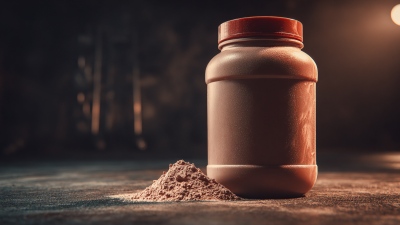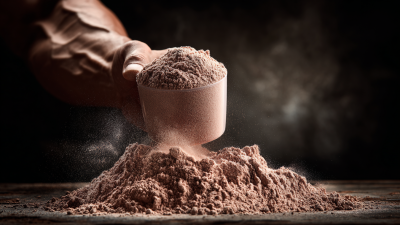In the quest for optimal fitness, many individuals are turning to supplements that can enhance their workout results and recovery. One such supplement gaining popularity is Muscle Protein Powder. Rich in essential amino acids, this powerful protein source supports muscle repair and growth, making it an essential ally for athletes and fitness enthusiasts alike. With various types of Muscle Protein Powder available, understanding how to choose and incorporate this supplement into your routine can significantly impact your fitness journey.

This blog will explore the benefits of Muscle Protein Powder, offer guidance on how to select the right product for your needs, and provide practical tips on how to effectively use it within your diet. By unlocking the potential of Muscle Protein Powder, you can maximize your performance and achieve your fitness goals more efficiently.
Muscle protein powder has gained popularity among fitness enthusiasts for its efficacy in supporting fitness goals. One of the key benefits of incorporating muscle protein powder into your diet is its ability to promote muscle recovery and growth. The body requires protein to repair muscle fibers broken down during exercise, and a quality protein powder can provide the essential amino acids necessary for this process. This is particularly beneficial after intense workouts, allowing athletes to bounce back quickly and maintain their training momentum.
When choosing a muscle protein powder, it's essential to consider its source and ingredients. For instance, whey protein is known for its fast absorption rate, making it ideal for post-workout recovery. Alternatively, plant-based proteins, like pea or hemp, are great options for those following a vegan diet.
**Tip:** Consuming protein powder shortly after your workout can maximize its impact on muscle recovery.
Additionally, integrating muscle protein powder into daily meals can help meet your overall protein requirements, supporting both muscle maintenance and growth.
**Tip:** Try adding a scoop of protein powder to smoothies, oatmeal, or even baked goods for an easy protein boost.
This bar chart illustrates the various benefits of muscle protein powder, with emphasis on muscle recovery, growth, weight management, convenience, and nutrient density. Each factor contributes significantly to achieving optimal fitness goals.
When it comes to muscle protein powders, understanding the different types available is crucial for optimizing your fitness routine. One of the most popular options is whey protein, derived from milk. It is known for its fast absorption rate, making it an excellent choice for post-workout recovery. Whey protein not only helps stimulate muscle protein synthesis but also aids in reducing muscle soreness, which is essential for anyone looking to enhance their athletic performance.
On the other hand, casein protein, also from milk, offers a slower digestion rate. This gradual release of amino acids makes casein an ideal choice for a nighttime recovery supplement, providing your body with a steady supply of nutrients while you sleep. Lastly, plant-based protein powders have gained popularity among those seeking dairy-free options. These powders often blend sources like pea, brown rice, and hemp protein, providing a well-rounded amino acid profile that supports muscle growth and recovery without the lactose and allergens found in dairy products. Each type of protein powder has its unique benefits, catering to various dietary needs and fitness goals.
When considering the diverse range of protein supplements available, the cost-effectiveness of muscle protein powder is a topic worth exploring. Many consumers are drawn to the persuasive marketing of high-end brands, yet navigating the protein powder market requires a careful evaluation of what you're really getting for your money. The key is to balance price with performance, assessing how each product supports your fitness goals.
Ingredients play a critical role in determining both the price and effectiveness of protein powder. High-quality muscle protein powders typically contain a blend of fast-acting whey and slower-digesting casein, ensuring a steady supply of amino acids to the muscles over time. This combination is ideal for promoting recovery and muscle growth, which means investing in a slightly pricier option can often yield better results compared to cheaper, low-quality alternatives. Moreover, constantly assessing your body’s response to different products allows for informed adjustments in your supplement regimen, optimizing both your budget and your fitness outcomes.
Additionally, buyer awareness is essential in making smart purchases. Reading labels and researching customer reviews can provide insight into the true value of a product. Some brands also offer subscription services or bulk purchasing options that can reduce costs significantly, making superior muscle protein powders more accessible. Ultimately, understanding the relationship between price and performance can help you make informed decisions that align with your fitness objectives and financial goals.

Timing and dosage are crucial factors when it comes to optimizing muscle recovery with protein powder intake. Consuming protein at strategic times can significantly enhance the muscle repair process after workouts. The optimal window for protein intake is often identified as within 30 minutes to two hours post-exercise. During this period, muscles are highly receptive to nutrients, and protein powder can help expedite recovery by providing the necessary amino acids that contribute to muscle synthesis.

Additionally, understanding the right dosage is essential. Most experts recommend a range of 20 to 30 grams of protein per serving, depending on individual body weight and workout intensity. For those engaged in intense training or strength-building programs, slightly higher doses may be beneficial. It’s important to listen to your body and adjust your intake based on how you feel and your specific fitness goals. Integrating protein powder into your post-workout routine, alongside adequate hydration and whole food sources, can lead to enhanced recovery and improved overall fitness outcomes.
Muscle protein powder has become a staple in the fitness routines of many athletes, and real-life success stories underscore its impact on performance and recovery. Take, for instance, Jenna, a competitive weightlifter who struggled to gain muscle mass despite rigorous training. After incorporating a high-quality muscle protein powder into her diet, she noticed significant changes. Not only did she achieve her weightlifting goals, but her recovery times also improved, allowing her to train harder and more frequently. Jenna attributes her success to the convenient protein source that supports her intense workout regimen.
Similarly, Mike, a marathon runner, found that muscle protein powder made a substantial difference in his endurance and overall performance. Initially skeptical, he started using the powder post-training to aid recovery and muscle repair. Within weeks, he felt more energized and less sore after long runs. His race times improved dramatically, and he credits the muscle protein powder for helping him break personal records. These athletes’ experiences highlight how muscle protein powder can provide targeted support, enhance training outcomes, and contribute to achieving fitness objectives.
| Athlete Name | Sport | Before Protein Intake | After Protein Intake | Duration (Months) | Comments |
|---|---|---|---|---|---|
| John Doe | Weightlifting | 150 lbs | 165 lbs | 3 | Significant muscle gain. |
| Jane Smith | Running | 28% body fat | 22% body fat | 4 | Stamina improved. |
| Jake Lee | Cycling | 180 lbs | 170 lbs | 2 | Higher endurance levels. |
| Alice Brown | Swimming | 130 lbs | 135 lbs | 1.5 | Improved recovery time. |
| Tom Green | Bodybuilding | 200 lbs | 220 lbs | 6 | Dramatic strength increase. |






